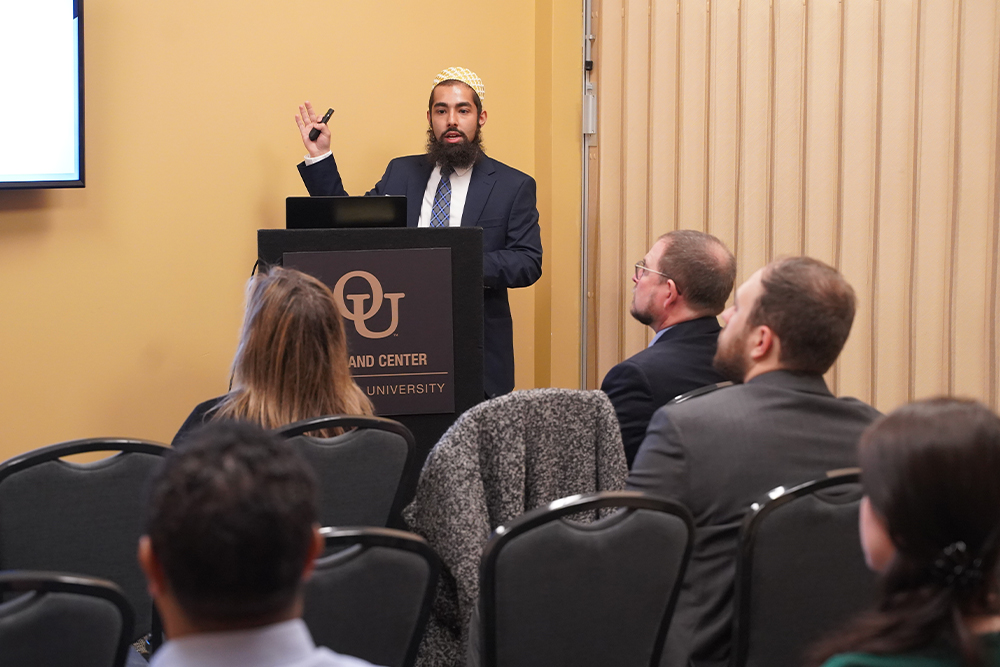
Research by an OUWB student believed to be the first-of-its-kind sheds light on motivating factors for fasting amongst Muslim students in the U.S. during Ramadan.
“Intrinsic vs. Extrinsic Motivators for Ramadan Intermittent Fasting in U.S. Students” was led by Ahmed Hussain, M3. Mentors for the project were Changiz Mohiyeddini, Ph.D., and Suzan Kamel-ElSayed, Ph.D.
Hussain presented the work at the Oakland University Graduate Research Conference on March 10.
According to the research, internal motivation has a more significant effect than external motivation for intermittent fasting during Ramadan. Hussain said knowing this information in the U.S. — where Muslims are considered a minority — can help people like doctors better understand the culture.
“People who identify with their health care providers are more likely to speak on personal matters,” said Hussain.
“If we can get into the minds of patients, we can interact with them better on a personal level.”
Mohiyeddini stressed how important it is for doctors to understand fasting, especially as it relates to Ramadan.
“A significant proportion of the U.S. population are Muslim who engage in Ramadan fasting,” he said. “Physicians should be educated on the motives, goals and the expectations related to Ramadan fasting to better understand and plan their treatment plans.”
‘Back to our roots’
Muslims are members of Islamic faith, with two major sects: Sunni and Shia.
The Muslim population in the U.S. continues to grow. In 2017, there were about 3.5 million Muslims in the U.S. Today, there are about 4.4 million. About 25% are under the age of 18.
Ramadan is the month during which it’s believed that the Quran was revealed to the Prophet Muhammad. Hussain said Ramadan is “one of the, if not the, holiest months on the Islamic calendar” as Muslims gather throughout the month for prayer, reflection, and community.
“It’s about being together with family and friends and remembering why we believe what we believe, and getting back to our roots,” he said.
For 30 days, Muslims also fast from all water, food, and medications from dawn to dusk. Fasting is considered obligatory for all observant Muslims, including adolescents who typically start the practice at puberty.
Why the adolescents start the practice was at the root of Hussain’s research.
The power of internal motivation
Similar studies have been done in primarily Muslim countries and largely excluded psychological variables. Other studies have looked at fasting during Ramadan in the context of diabetes among young children, or the effects on physical capabilities of young children.
However, Hussain said the team could not find research done in the U.S. with regard to Muslim students and their motivations for intermittent fasting during Ramadan.
For the study, intrinsic motivators were defined as those regarding one’s religion as the primary life motive, and internalizing the core values of the religion into one’s practice.
Extrinsic motivators are those in which religion is a motive for other desired ends, such as status, self-justification, security, social support, and comfort.
Muslim students between the ages of 15-37 were surveyed immediately after the month of Ramadan in May 2022. All participants had to be enrolled in a full-time educational program during the month.
Surveys were sent to Muslims throughout the U.S. A total of 527 responses were considered valid. Almost half were between the ages of 19 and 22. Respondents were asked to rank on a scale of 0-3 their primary motivation for practicing Ramadan.
“The results of this study show that intrinsic motivation has a strong role to play in the outcomes of fasting for students, even in Muslim minority countries,” said Hussain.
The survey found that the two highest motivators were respondent beliefs in the five pillars of Islam, and “my personal belief.” Both are considered internal motivators.
The lowest motivators were competition among friends, and peer pressure — both extrinsic motivators.
“Adolescents tend to anchor their religious beliefs on those of their parents, elders, other members of the community, or even friends,” said Hussain. “However, the results of this study suggest that internal motivation has a more significant effect than external motivation (for intermittent fasting during Ramadan).”
Looking ahead
Hussain said it’s possible that the study could be expanded.
| More from OUWB |
First-of-its-kind Ramadan event hosted by OUWB med students draws from across Michigan Fasting by children during Ramadan needs better understanding, finds study led by OUWB alum |
For example, the survey could be conducted pre- and post-Ramadan (the original was only done post). Hussain said the scale used to score survey answers also could be further refined.
“Further research into other aspects of (fasting during Ramadan) is likely to provide even more insight into the nature of practice among young individuals in the U.S. and other Muslim minority countries,” Hussain said during the research conference.
Mohiyeddini said, overall, the study is a solid first step in offering better understanding.
“Understanding the motivating factors behind the practice of fasting during Ramadan can help individuals better appreciate and participate in the observance, regardless of their religious affiliation,” he said.
“In addition, scientific exploration of religious practices can enhance, improve interfaith relationships by enhancing mutual empathy and compassion, and inspire personal growth and reflection,” said Mohiyeddini.
He added that “knowledge gained from Ramadan fasting could be applied to inform medical interventions that require patients to take charge of their nutrition.”
For more information, contact Andrew Dietderich, marketing writer, OUWB, at [email protected].
This work is licensed under a Creative Commons Attribution-NonCommercial 4.0 International License.

